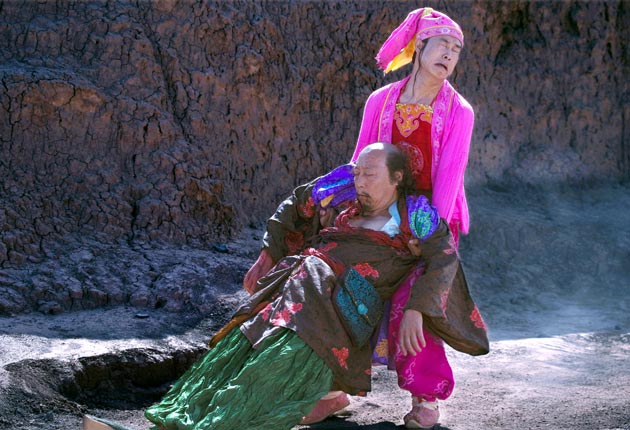A Woman, A Gun and a Noodle Shop, Film Festival, Berlin
Coens remade in finest China

Your support helps us to tell the story
From reproductive rights to climate change to Big Tech, The Independent is on the ground when the story is developing. Whether it's investigating the financials of Elon Musk's pro-Trump PAC or producing our latest documentary, 'The A Word', which shines a light on the American women fighting for reproductive rights, we know how important it is to parse out the facts from the messaging.
At such a critical moment in US history, we need reporters on the ground. Your donation allows us to keep sending journalists to speak to both sides of the story.
The Independent is trusted by Americans across the entire political spectrum. And unlike many other quality news outlets, we choose not to lock Americans out of our reporting and analysis with paywalls. We believe quality journalism should be available to everyone, paid for by those who can afford it.
Your support makes all the difference.Zhang Yimou's remake of the Coen brothers' Blood Simple is exhilarating and inventive. The setting is as far removed from conventional film noir territory as can be imagined. The drama plays out in the deserts of northern China. It is also set in a time when guns are new and swords and spears are still the weapons of choice.
On the face of it, we are a world away from the universe of the Coens. But this is a faithful adaptation, in its way. Human motivations are very similar, whether in Zhang's China or dusty rural Texas.
The film is gorgeous to look at, shot (in the initial scenes) in eye-popping colour. As in the best noirs, the plotting is embroiled. Wang is a noodle shop owner who treats his wife with contempt. He is a lazy, avaricious man with a peasant cunning. The wife buys a gun from a merchant passing through town and demands that her lover uses it to kill her husband. In the meantime, the husband has recruited a patrol officer to kill the wife and the lover. To make a tangled story even more complex, the patrol officer has a murderous agenda of his own.
In truth, the characterisation is not very deep. Some of the slapstick, especially early on, plays like Benny Hill. There is a goofy servant with a buck tooth who blunders around in the background, to grating effect.
You could quibble that the film is a formal exercise – but it is a bravura one. This is very pure cinema that evokes memories of swashbuckling silent movies. As he has shown in epics like Hero and House of Flying Daggers (or the opening of the Beijing Olympics), Zhang is an expert in choreographing balletic action sequences. Midway through, the film all but abandons dialogue. There is something ritualised and fatalistic about the storytelling – a sense that the characters' behaviour is preordained. They are all blundering toward catastrophe.
Coen brothers aficionados will notice plenty of ideas and motifs. In a suitably bloodcurdling finale, we see a hand pinioned to a wall with a pair of scissors. There is a corpse that comes back to life, out of its dusty grave. At times, you almost expect to see Frances McDormand in a kimono or M Emmet Walsh wielding a sword.
Zhang's formal mastery is little short of astonishing. He may not have an obvious flair for comedy but there are few film-makers who use colour or sound editing in such a bravura way. As the film progresses, the high jinks of the early scenes are forgotten as the tension increases and the blood begins to flow.
A Woman, a Gun and a Noodle Shop is not such an outlandish enterprise as it may first appear. Akira Kurosawa acknowledged his debt to Dashiell Hammett. Many American westerns looked to Asian samurai or action movies. Zhang is following a long tradition of cultural exchange. Now what we need is for the Coens to give us their version of House of Flying Daggers.
Join our commenting forum
Join thought-provoking conversations, follow other Independent readers and see their replies
Comments